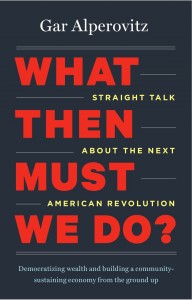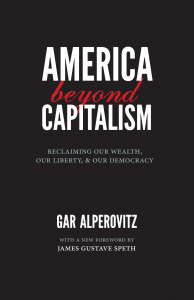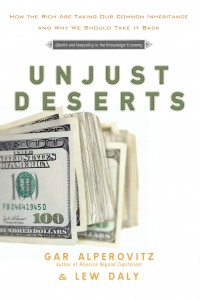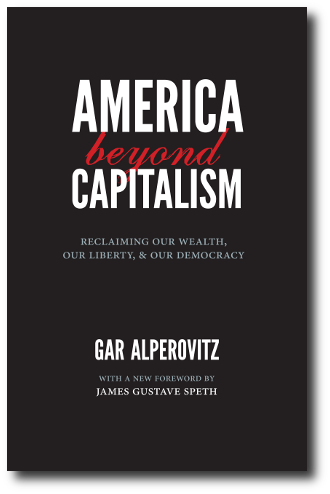Thanks to the wonderful organizers at Cooperation Texas, I recently had the chance to address a gathering of co-op activists at the 5604 Manor space in Austin. Here’s the audio from my talk:

"This book offers by far the most serious, intellectually grounded strategy for system-changing yet to appear. It could be the most important movement-building book of the new century..."
—Daniel Ellsberg, author of Secrets: A Memoir of Vietnam and the Pentagon PapersAvailable now from Chelsea Green Publishing
More info about What Then Must We Do?
Order now via Amazon
Order now via Indiebound
My film "The Next American Revolution": Stream now | More info

"Concrete and feasible ways to reverse the ominous course of the past several decades and to open the way to a vibrant democracy with a sustainable economy… A marvelous book…I recommend it all the time"
—Noam Chomsky
"Highly readable; excellent for students…. A tonic and eye-opener for anyone who wants a politics that works."
—Jane Mansbridge, President-Elect, American Political Science Association, Adams Professor, John F. Kennedy School of Government, Harvard University

"This book opens an extraordinary new vista on the moral bankruptcy of our second Gilded Age."
—Bill MoyersRecently Posted
- Gar and Martin Sherwin in the LA Times: “U.S. leaders knew we didn’t have to drop atomic bombs on Japan to win the war. We did it anyway”
- 75th anniversary of the US atomic bombing of Japan: A discussion
- A conversation with Gar Alperovitz and John McKnight
- Gar interviewed in openDemocracy
- Read Gar’s new essay, “Building a Democratic Economy: Sketch of a Pluralist Commonwealth”
- Gar Alperovitz Keynote Address to at Bioneers 2018: Why We Need a Next System—And How to Get There
- Gar Alperovitz on What Will Replace Corporate Capitalism in the US
- Centrist Think Tanks Won’t Save Our Cities
- Gar Alperovitz, Historian and Professor of Political Economy Oberlin
- Listen to Gar Alperovitz on Corporations and Democracy
- The New Economy and the Quietly Emerging Next System with Gar Alperovitz
- Black Monday, ’77, When the Mill Shutdown in Youngstown Gave Birth to the Rust Belt
- Democratic Ownership and the Pluralist Commonwealth: The Creation of an Idea Whose Time Has Come
- Pluralism vs. Authoritarianism: Gar Alperovitz with Laura Flanders
- Principles of a Pluralist Commonwealth
- Gar Alperovitz on the Ralph Nader Radio Hour
- Gar Alperovitz on Forthright Radio
- Progressive Visions: The Pluralist Commonwealth
- C-Span BookTV: Principles of a Pluralist Commonwealth
- Gar Alperovitz, co-founder, Democracy Collaborative, and co-chair, The Next System Project, speaks with Diane Horn about buying out the fossil fuel industry to address climate change
Get in touch
 AMERICA BEYOND CAPITALISM
AMERICA BEYOND CAPITALISM
 As Mitt Romney and the Republican establishment continues to attack President Obama for daring to claim that business owners depend on public infrastructure to make a profit, many commentators on the left are pointing out the irony of how such and such Republican business person decrying the “you didn’t build that” line received such and such direct subsidy from the government. But this misses the larger point: in a technologically advanced society like our own, gains in productivity are overwhelmingly attributable first and foremost to the rapidly growing common inheritance of human knowledge, a point I explored in depth in my book with Lew Daly, Unjust Deserts.
As Mitt Romney and the Republican establishment continues to attack President Obama for daring to claim that business owners depend on public infrastructure to make a profit, many commentators on the left are pointing out the irony of how such and such Republican business person decrying the “you didn’t build that” line received such and such direct subsidy from the government. But this misses the larger point: in a technologically advanced society like our own, gains in productivity are overwhelmingly attributable first and foremost to the rapidly growing common inheritance of human knowledge, a point I explored in depth in my book with Lew Daly, Unjust Deserts. Agenda
Agenda  Posterboard
Posterboard 